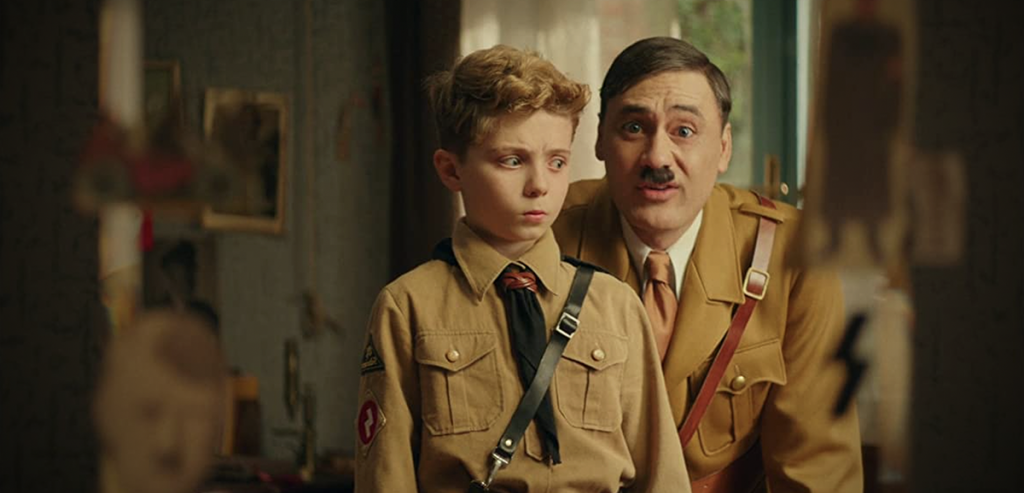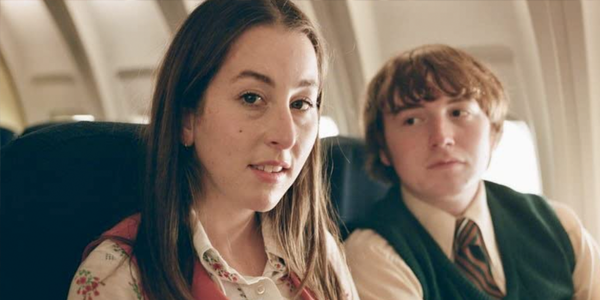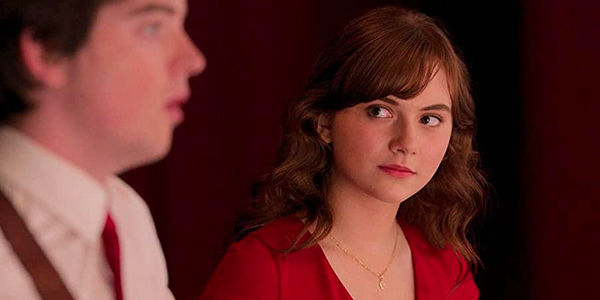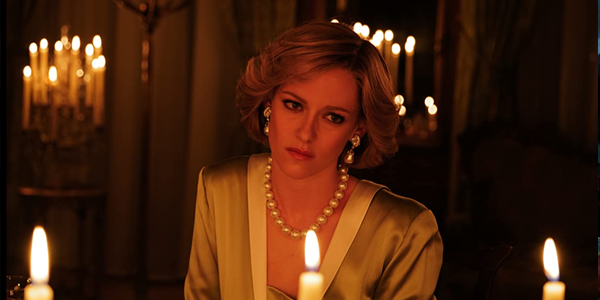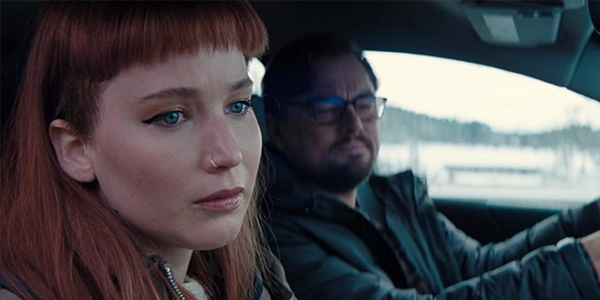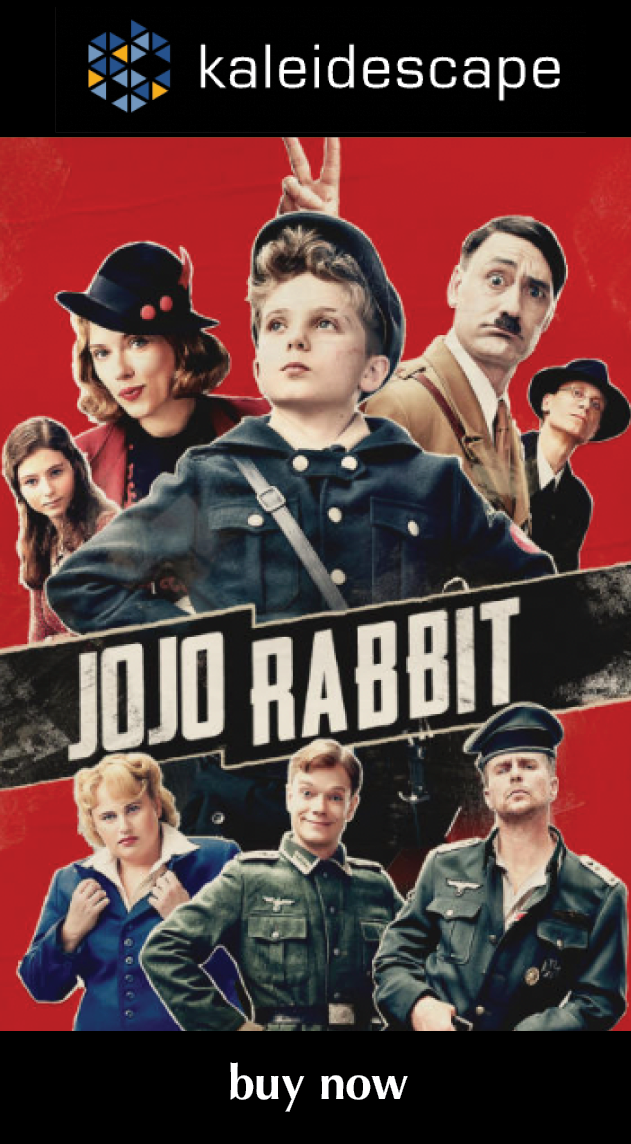recent reviews
Sign up for our monthly newsletter
to stay up to date on Cineluxe
Seemingly about a Hitler-obsessed German youth, Taika Waititi’s absurdist comedy turns out to be aimed more at the cultural absurdities of the present
by Dennis Burger
February 7, 2020
In any other year, Jojo Rabbit would be fighting for the top spot among my favorite recent films. This absurdist lark from Taika Waititi (Flight of the Conchords, What We Do in the Shadows, Hunt for the Wilderpeople) is exactly what you would expect upon learning that the crazy bastard who actually made a great Thor movie against all odds then turned his weird attention toward the Holocaust and the Hitler Youth.
On the surface, Jojo Rabbit is the tale of a young lad so infatuated with der Führer that he conjures Hitler out of thin air, Calvin & Hobbes-style, not only as a best imaginary friend but also as a fellow agent of unwitting chaos and something of a conscience. Things take a turn for the weirder when little Jojo discovers a Jewish girl hiding within the walls of his home and is forced to choose between the safety of his family and his commitment to an ideology he doesn’t understand in the slightest.
And if that’s as far as you decide to dig, there are loads of laughs to be had, assuming you’re not horribly offended by the premise. So many, in fact, that by the time the closing credits rolled, my cheeks legitimately hurt and I swear I felt abs forming under my tubby middle-aged tummy.
But just as Waititi used the laugh-a-minute Thor: Ragnarok as a vehicle for some very real ruminations about colonialism and the lasting impacts thereof, he uses Jojo Rabbit to not only take the piss out of fascism, but also to explore its appeal. Seriously, what causes a precocious little boy to Sieg Heil! and buy into all manner of horrible conspiracies about the Jewish people? Furthermore, why is it that bumbling idiots seem to hold such sway over massive swaths of the general population? Waititi seems to be saying that if we can’t understand that, we’re ill-equipped to combat it.
Unlike so many other filmmakers who have recently grappled with notions about why inherently good people do bad things, Waititi actually has answers. Pretty simple ones, when you get right down to it, but answers nonetheless.
His primary conclusion: “We’re asking the wrong questions.” Right from the opening scene, Waititi uses a German dub of the Beatles’ “I Want to Hold Your Hand,” cut together with screaming crowds of Nazis that are almost indistinguishable from fawning crowds of Beatlemaniacs to slyly point to the fact that cults of personality—any personality—are at least part of the problem.
Along the way from that cheeky beginning to the inglorious end of World War II, Waititi takes shots at groupthink, cognitive dissonance, nationalism, and identity politics in equal measure, but when you get right down to it, what he seems to be saying is that the root of all our problems is a lack of genuine human connection. And he uses the anachronistic disconnect between his setting and his choice of soundtrack music, language, and mannerisms to point out that, for all our pontification about social media and modern life, this isn’t a new phenomenon.
None of this should come as a surprise if you’re already familiar with Waititi’s work. What does come as a surprise is how often he plays it safe with this one. I guess he figured he had to tug on the reins from time to time to keep from offending literally everyone, and maybe he has a point. I wouldn’t know, since I’m not offended by much of anything. But sometimes the tonal shifts toward the conventional seem a little forced and insincere. Thankfully, the expected turn toward the sentimental at the end of the film is pulled off with such heartfelt authenticity that it’s difficult not to wooed by it all.
My only remaining niggle—and this is entirely subjective—is that Scarlett Johansson is somewhat miscast as Jojo’s mother. And I say this as someone who thinks Johansson is actually underrated as an actor. She positively transforms her body language and her entire demeanor for the part, but something about it all doesn’t feel quite right. Especially when the rest of the casting—especially the two adolescent leads—is so spot on.
Another unexpected thing is how gorgeous the film is from beginning to end. Mihai Malaimare, Jr., in his first collaboration with Waititi as far as I can tell, proves himself to be an absolute master of color theory, bathing nearly every scene with a deft mix of rich warm hues and crisp, cool punctuation that’s delivered beautifully by Kaleidescape’s 4K HDR presentation. Jojo Rabbit was shot at 3.4K and finished in a 2K digital intermediate, so it might not satisfy the dermatologically obsessed or those who chase razor-sharp edges. But the expanded color gamut of HDR10 does wonders for the mix of subtle pastels and retina-shocking primary hues.
Whatever concerns you may have about resolution, this is one you’ll want to watch on as large a screen as possible, by the way. Malaimare goes for some unexpected long shots at times to capture the beauty and scope of the scenery during some dialogue-heavy scenes, where other cinematographers might have opted for tight closeups instead. In a world where streaming video is squeezing commercial cinemas out of the equation more and more every year, he defiantly composes for a massive canvas, assuming (hoping?) that the images will take up as much of the viewer’s field of view as possible.
The sound mix isn’t quite as expansive but Kaleidescape’s DTS-HD Master Audio 5.1 is a faultless presentation of it. The sound design is far more interested in servicing the needs of the film than exercising your speakers, and as such it’s largely a three-channel mix, spread across the front, with surround channels only used to add ambience and a sense of space until late in the film when the action gets a little Looney Tunes. But that’s exactly the approach this film needs.
As I said, in any other year, Jojo Rabbit would be hovering right near the top of my annual favorites. If there’s anything truly working against it, it’s not the instances in which Waititi plays it safe, or in which Johansson’s knack for emotional complexity works against her in a role that should be more one-note until it isn’t. No, the only thing really holding the film back is that it’s forced to share oxygen with a comedy like Parasite, which is more unapologetically unflinching and navigates its tonal shifts more effectively.
But don’t let that keep you from watching this one. Any film that can make me guffaw as hard and as frequently as this one did without insulting my intelligence has a spot in my film library. It may not be perfect, but it’s a necessary film right now.
Dennis Burger is an avid Star Wars scholar, Tolkien fanatic, and Corvette enthusiast who somehow also manages to find time for technological passions including high-end audio, home automation, and video gaming. He lives in the armpit of Alabama with his wife Bethany and their four-legged child Bruno, a 75-pound American Staffordshire Terrier who thinks he’s a Pomeranian.
PICTURE | The film’s deft mix of rich warm hues and crisp, cool punctuation is delivered beautifully by Kaleidescape’s 4K HDR presentation
SOUND | The sound design is far more interested in servicing the needs of the film than in exercising your speakers, and as such it’s largely a three-channel affair that’s faultlessly presented by Kaleidescape’s DTS-HD Master Audio 5.1 mix
© 2023 Cineluxe LLC


